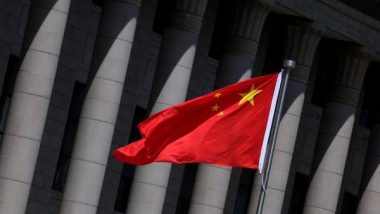Beijing, April 23: China's support to Russia in opposition to the enlargement of NATO has given rise to concerns in the Eastern and Central European countries about the reliability of the Asian giant as a partner which can be counted on, a report said.
The perception of China has been shifting as well with Central and Eastern Europe's attention currently fixed on the Russian invasion of Ukraine, the Mercator Institute for China Studies (MERICS) report said. 'United States Afraid That Ties Among China, Russia, and India May Develop Further', Reports Chinese State Media.
A decade ago, China set up shop in Central and Eastern Europe through its format of cooperation with Central and Eastern European (CEE) countries (the so-called "16+1"), the report said, adding, the CEE countries originally welcomed China's interest as they saw it as an opportunity to diversify their mostly West-bound trade routes.
These expectations, however, have not fully materialized with the overall Chinese investment in Europe continuing to fall from 2016 to 2020, with Central and Eastern Europe absorbing a mere 3 per cent of the country's total investments in 2020, the report said.
Pre-coronavirus Chinese FDI to Central and Eastern Europe were modest and concentrated in a few countries, with Hungary, Czechia and Poland at the forefront. The rest of the countries did not receive big investments, especially not in the higher value-added sectors.
The growing disillusionment on the lack of tangible results from the cooperation with China was further accentuated when China addressed political threats to the countries which decided to prioritize relations with Taiwan, the report said.
Lithuania, for instance, has been targeted by economic sanctions for its decision to open the Taiwanese Representative Office - instead of using the common title Taipei Economic and Cultural Office - in Vilnius in 2021.
The situation has changed recently as most CEE countries (with notable exceptions of Hungary and Serbia) now understand that economic benefits may be illusionary and that considerable political and security risks stemming from cooperation with China should also be taken into consideration, the report further said.
In the joint communique, signed by Xi Jinping and Putin on the sidelines of the Olympic Games in Beijing in February, Beijing backed Russia in opposition to the enlargement of NATO and said, "the Chinese side is sympathetic to and supports the proposals put forward by the Russian Federation to create long-term legally binding security guarantees in Europe".
CEE quickly translated the message as support for Russian demands to reverse NATO borders to the pre-1997 situation. If China is regarded as supporting Russian goals of pushing NATO back before the 1997 enlargement, it can be expected that Central and Eastern Europe will treat Beijing as an explicit threat, the report concluded.
(The above story is verified and authored by ANI staff, ANI is South Asia's leading multimedia news agency with over 100 bureaus in India, South Asia and across the globe. ANI brings the latest news on Politics and Current Affairs in India & around the World, Sports, Health, Fitness, Entertainment, & News. The views appearing in the above post do not reflect the opinions of LatestLY)













 Quickly
Quickly


